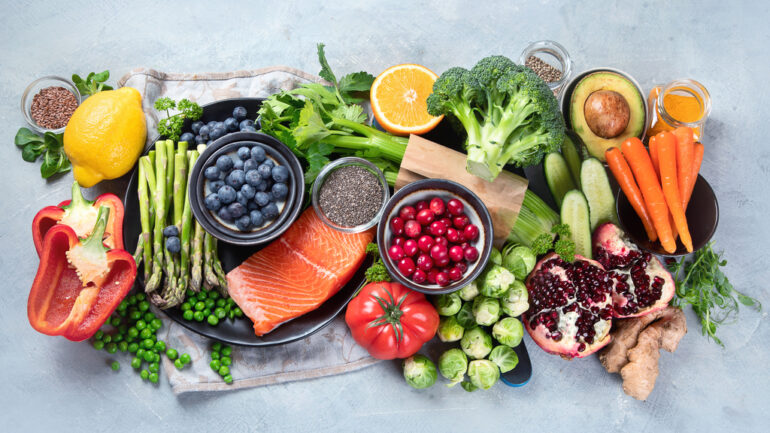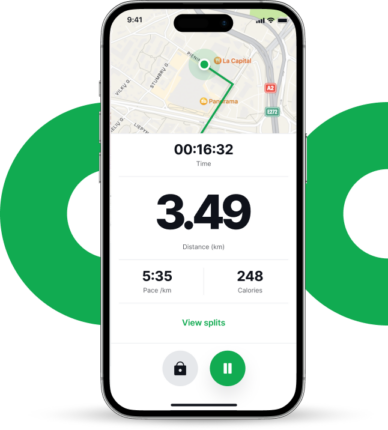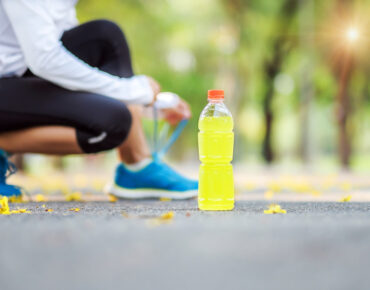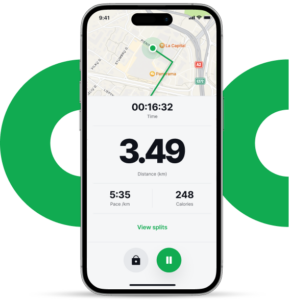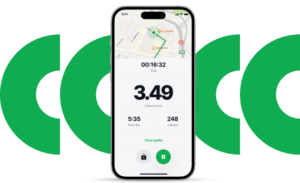There have been accounts of professional athletes eating what seems to be an unlimited amount of calories each day to fuel their intense training sessions. This brings the question of what is diet for runners and what pro runners eat every day. Let’s see what these ultra-athletes consume regularly and what we can bring into our own eating plans.
In This Article:
Can Runners Eat Whatever They Want?
The most commonly-touted case of eating a ton of calories each day as a professional athlete is the account of Michael Phelps’ diet of 12,000 calories per day to fuel his training to earn a record-breaking number of gold medals. By his own account, the amount was closer to 8–10 thousand calories per day, which is still a tremendous amount.
But this story makes headlines because it is an outlier instead of the standard. When examining the data of the number of calories burned, we’ll find that you can’t outrun a bad diet.
For example, a 185lb individual running 10 miles per hour will burn about 1,342 calories per hour. So, keeping that fast pace for 4 hours would still only be 5,368 calories burned. In addition to the person’s basal metabolic rate and other estimations, that would still fall below the 10,000 calories that Phelps ate daily.
So, even if a pro runner ran 40 miles per day at 10 miles per hour, they still wouldn’t be able to eat whatever they wanted all the time. Nobody is running that distance and pace daily, either.
So, it boils down to this: exercise, no matter how long or intense, isn’t an invitation to eat whatever you want. You can always overeat beyond what you burned through running, and it’s typically quite easy.
What Does a Pro Runner Eat in a Day?
Pro runners across disciplines tend to eat very similar diets, with individual differences in the energy substrates and demands placed on muscles for their running type. Sprinting is much different than running a marathon. But, many of the diets of pro runners look similar, regardless of their duration and speed.
For example, Usain Bolt eats plenty of carbohydrates and protein, with a limited amount of fat. His daily diet can include things like:
- Egg sandwiches
- Pasta
- Corned beef
- Plenty of fresh fruit and Gatorade for carbohydrates
- Chicken
- Dumplings
On the other end of the spectrum, you have the marathon superstar Eliud Kipchoge who utilized a plant-based diet with around 85% of carbohydrates, 10% of protein, and 5% fat.
Some competitors prefer the ketogenic lifestyle, choosing a high-fat, moderate-protein, and ultra-low-carbohydrate diet.
What you’ll find is that most pro runners eat whole foods that act as healthy sources of macronutrients and micronutrients.
The Best Foods Every Runner Should Include in a Meal Plan
Whether you are in the high-carbohydrate or the keto-club, you need to fuel your running bouts with the proper energy forms.
The runner’s main source of calories should come from the energy substrate utilized during their running. For carbohydrate-based diets, this means plenty of complex carbohydrates further from the run and more simple carbohydrates closer to the run for sustained energy. Keto-athletes need healthy fats further from the run and exogenous ketones closer to the run to be able to match the energy levels of a carbohydrate-based diet.
Here are some good sources of complex and simple carbohydrates for a runner:
- Oats
- Rice
- Quinoa
- Pasta
- Fruit
- Fast-acting sports drinks, like Gatorade
Runners also need protein to repair their muscles and connective tissue. The shorter the running distance and the faster the pace, the more protein is required. Again, whole food sources are best. Lean meats are great. Vegan proteins are great as well because most are full of complex carbohydrates.
Here are some excellent protein sources for runners:
- Fish
- Poultry
- Lean cuts of beef and pork
- Lentils
- Chickpeas
Fat is the last macronutrient to fill in gaps for a carbohydrate-based diet (carbs are in this category for keto-athletes). Here are some healthy sources of fats for runners to stay healthy with optimal hormone balance:
- Saturated fats like animal fats, avocado, coconut
- Polyunsaturated fats, including nuts, seeds, fish
- Monounsaturated fats like olive oil
What to Include in Diet for Runners?
Eating enough to fuel your sessions and make optimal progress without weight gain is the goal if performance is your main target. If you want to lose weight, you need to eat a bit less without affecting your performance too much. You can also add some low calorie snacks to your diet.
Finding the balance of calories and macronutrients will take experimentation and maybe even working with a professional to devise an optimal plan for your running needs.
For recreational runners who just want to be a little more efficient, tracking the caloric intake and adjusting it based on your weight and performance is a simple process that will get you great results.
Key Takeaways:
- Regardless of how much you exercise, you won’t be able to eat whatever you want without gaining weight. You can never run long and fast enough to be able to eat unlimited food.
- Professional runners typically eat a high-carbohydrate, moderate-protein, and low-fat diet to supply their energy needs, help their recovery, and prepare for future runs.
- The best diet for runners are typically whole foods that give healthy amounts of macronutrients and micronutrients in proper ratios.
- Calorie and macronutrient intake should be tracked and adjusted accordingly to ensure an optimal diet for running.
Frequently Asked Questions
How many calories should a runner eat per day?
There’s no one-size-fits-all answer, as calorie needs depend on numerous factors:
- Individual: Age, sex, weight, height, activity level (training intensity and duration)
- Goals: Weight loss, maintenance, performance enhancement
- Training phase: Base building, high mileage, tapering
However, here are some general guidelines:
- Estimate basic metabolic rate (BMR): online calculators can help.
- Factor in activity level: multiply BMR by an activity factor based on your training intensity and duration.
- Fine-tune based on goals: adjust calories in/out for weight management or performance.
Are eggs good for runners?
Yes! Eggs are a great source of:
- Protein: essential for muscle building and repair.
- Healthy fats: provide sustained energy and support nutrient absorption.
- Choline: important for brain function and muscle recovery.
- Vitamins and minerals: contribute to overall health and performance.
Eggs are versatile and can be enjoyed pre-run, post-run, or throughout the day.
What is the best meal for runners?
There’s no single “best” meal, but prioritize:
- Balance: carbohydrates, protein, and healthy fats for sustained energy and recovery.
- Timing: pre-run meals should be easily digestible, post-run meals should replenish glycogen stores and repair muscle.
- Personal preference: choose foods you enjoy and can adhere to consistently.
Examples:
- Pre-run: oatmeal with banana and almond butter, whole-wheat toast with avocado and eggs.
- Post-run: chicken breast with brown rice and veggies, salmon with quinoa and roasted vegetables
How often should runners eat?
Frequency depends on individual needs and training schedules. Some prefer 3 larger meals, while others spread their intake across smaller, more frequent snacks.
- Listen to your body: eat when you’re hungry and avoid overeating.
- Experiment: find a frequency that fuels your runs and supports recovery.
- Don’t forget hydration: water is crucial throughout the day, especially during and after runs.
What is the best fuel for running?
There’s no magic bullet, but focus on:
- Carbohydrates: primary energy source for muscles, choose complex carbs like fruits, vegetables, and whole grains.
- Protein: aids in muscle repair and recovery, include lean protein sources like chicken, fish, or tofu.
- Healthy fats: provide sustained energy and support nutrient absorption, choose sources like nuts, seeds, and avocado.
Listen to your body, experiment with different foods, and consult a nutritionist for personalized recommendations. Remember, optimal fueling starts well before your run and continues throughout your day.
References
- Turner-McGrievy, G.M., Moore, W.J. and Barr-Anderson, D., 2016. The Interconnectedness of diet choice and distance running: Results of the Research Understanding the NutritioN of Endurance Runners (RUNNER) Study. International journal of sport nutrition and exercise metabolism, 26(3), pp.205-211.
- Rennie, M.J. and Johnson, R.H., 1974. Effects of an exercise-diet program on metabolic changes with exercise in runners. Journal of applied physiology, 37(6), pp.821-825.
- Hartung, G.H., Foreyt, J.P., Mitchell, R.E., Vlasek, I. and Gotto Jr, A.M., 1980. Relation of diet to high-density-lipoprotein cholesterol in middle-aged marathon runners, joggers, and inactive men. New England Journal of Medicine, 302(7), pp.357-361.
- Horvath, P.J., Eagen, C.K., Fisher, N.M., Leddy, J.J. and Pendergast, D.R., 2000. The effects of varying dietary fat on performance and metabolism in trained male and female runners. Journal of the American College of Nutrition, 19(1), pp.52-60.
- Williams, C., Brewer, J. and Walker, M., 1992. The effect of a high carbohydrate diet on running performance during a 30-km treadmill time trial. European journal of applied physiology and occupational physiology, 65, pp.18-24.

